Fresh squeezed orange juice is always on hand at my house. It is perfect to accompany breakfast, marinate any type of meat, or add into a cocktail. Here are tips for storing orange juice in the fridge or freezer and making this delicious juice last longer!
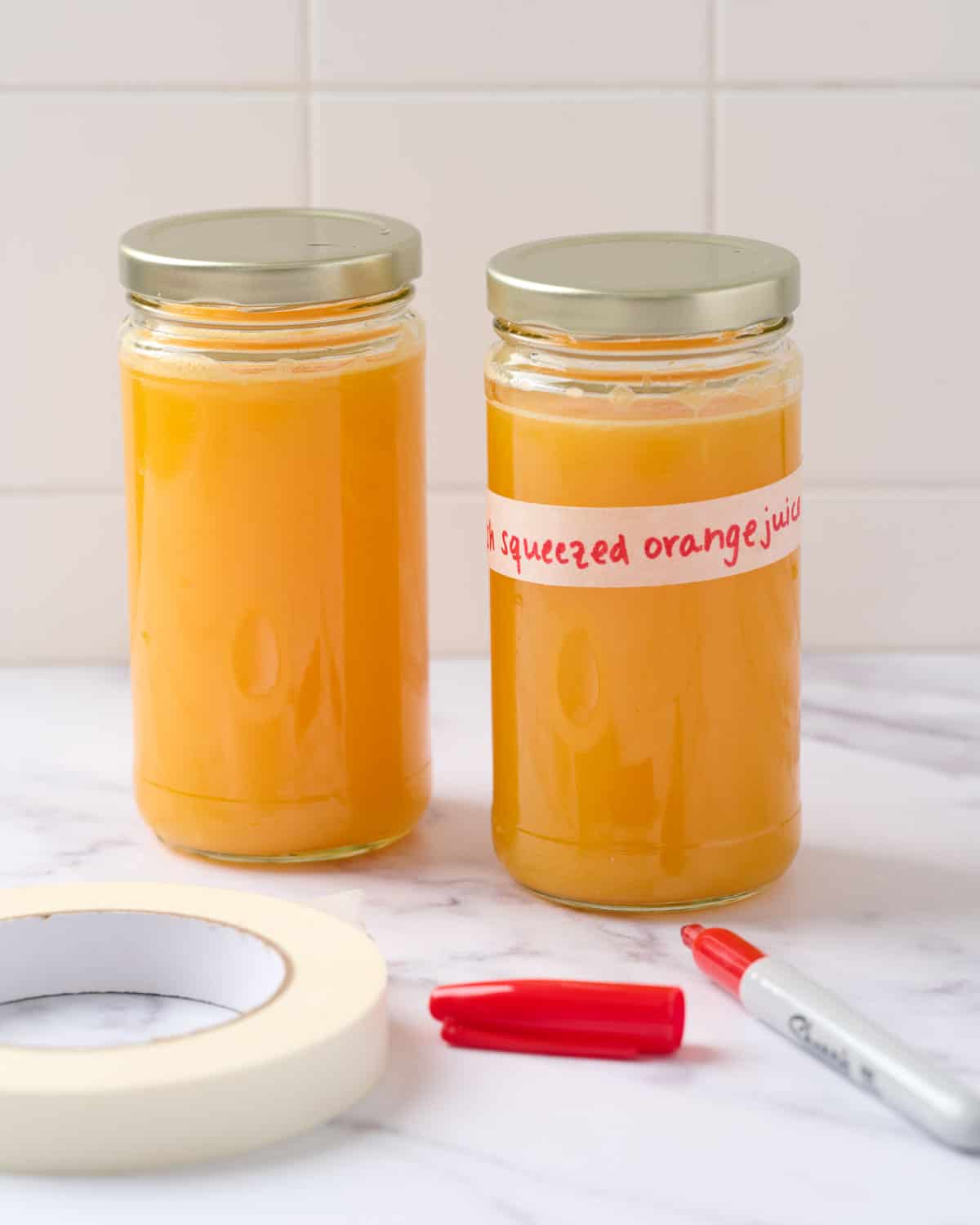
In this post, we are going to look at how long your fresh squeezed orange juice will last in the fridge, how to properly store your juice, and I will offer up some tips on how you can prolong your juice life even further.
Jump to:
- How to Make Fresh Squeezed Orange Juice
- Storing Orange Juice: Refrigeration vs Room Temperature
- Guide to Freezing Orange Juice
- General Orange Juice Storage Guidelines
- How do I know Orange Juice has Gone Bad?
- Can You Drink Orange Juice After its Expiration Date?
- Why Does Freshly-Squeezed Orange Juice Spoil Quicker than Store Bought Juice?
- Tips for Extending Orange Juice Freshness
- FAQs
- Recipes that Use Orange Juice
- 💬 Comments
Growing up in Florida during my elementary and middle school years, oranges were everywhere. Beyond the perfect glass of orange juice in the summertime, oranges continue to shape the way I cook by providing a sweet, bright and flavorful component to my dishes.
As I always say, there is no better way to consume citrus juice than by making it yourself! It’s easy, cheap, healthy, and so so fresh!
How to Make Fresh Squeezed Orange Juice
The best way to make freshly squeezed orange juice really comes down to what the most convenient way is for the oranges that you have chosen to juice. Unlike other fruits such as grapefruits, oranges come in a large variety of types and sizes. If you’re curious about what are the best types of oranges for juicing, check out my blog post dedicated exclusively to that!
For larger oranges such as Valencia and Navel oranges, simply squeezing the juice out with your hands is the easiest and quickest method. For smaller oranges such as Mandarins or Clementines, blending your oranges is the easiest way to extract the juice.
As always, you can use a citrus squeezer, a citrus reamer, an electric juicer, or any other kitchen tools you have at your disposal. Just remember to work smarter, not harder when it comes to juicing your own oranges!
For more, check out my Fresh Squeezed Orange Juice recipe and the Best Oranges for Juicing!
Storing Orange Juice: Refrigeration vs Room Temperature
When storing, the same process that you would use to store grapefruit juice applies to orange juice. Both are citrus fruits with high acid content and should be kept in the refrigerator after being made.
Refrigeration: The FDA recommends that orange juice, along with any other homemade juices and the majority of foods, be stored in the refrigerator at 40°F (4°C) or lower. The colder temperatures slows the growth of bacteria, prevent foodborne illnesses when consumed, and reduce the rate at which your juice will spoil in general.
With proper refrigeration, freshly-squeezed orange juice will last 2-3 days before spoiling.
Room Temperature: Orange juice will only last a couple of hours at room temperature without proper refrigeration, at which point the juice will begin to develop bacteria that could make you sick if consumed. I recommend moving your orange juice to the refrigerator as soon as you have finished juicing your oranges (but maybe after you pour a delicious and refreshing glass for yourself).
For more information about food storage and safety, visit the USDA website here.
Guide to Freezing Orange Juice
To extend the life of your orange juice, store it in the freezer! While the refrigerator will keep your juice safe for consumption for a couple of days, the freezer keeps your juice good for up to six months. The freezer will not compromise the flavor or the integrity of the juice, but how you choose to thaw your juice might, so prepare accordingly!
Freezing orange juice tips: Use freezer-safe containers or ice cube trays to portion out smaller quantities for future use. Be sure to leave some room for expansion in the container to prevent breakage.
Orange juice will last up to six months in the freezer!
Thawing frozen orange juice: Once it’s time to pull the juice out of the freezer, there are several methods you have to thaw it. Personally, I recommend either thawing in the refrigerator or in cold water, although you can reheat your juice in the microwave if you are low on time.
- Thawing in the refrigerator: Smaller containers of orange juice will need 4-6 hours to completely thaw in the refrigerator whereas larger containers may need upwards of 24 hours.
- Thawing in cold water: Place your container of juice inside a watertight plastic bag, then submerge your container into a bowl or pot of cold water. Change the water every 30 minutes or so to maintain a cold temperature, similar to how you would do so when thawing meat or vegetables in cold water. This method usually takes 1-3 hours for smaller containers and varies with larger containers.
- Thaw in the microwave: If you are in a rush, you can thaw your juice in the microwave, although I would not recommend this method. The microwave will affect the taste and texture of your juice, and you run the risk of overheating/cooking it as well. If you decide to microwave, do so on the lowest setting and monitor it frequently.
- Thawing at room temperature: I never recommend thawing at room temperature. After sitting at room temperature for a few hours, bacteria will begin to grow rapidly in the juice before it thaws, risking spoilage and illness when consumed.
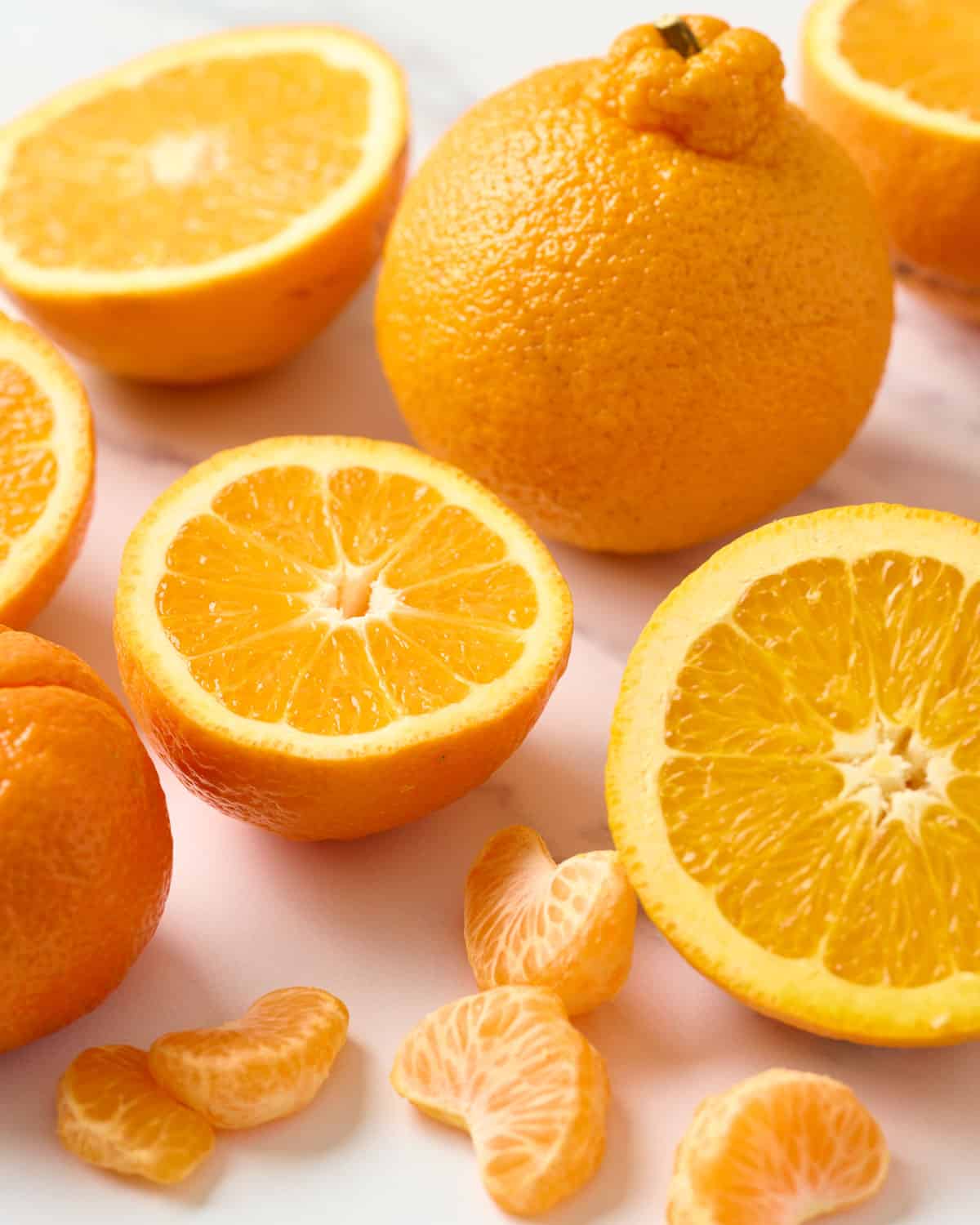
General Orange Juice Storage Guidelines
Refrigerate promptly: Freshly squeezed orange juice should be refrigerated immediately after preparation at 40°F (4°C) or lower to slow the spoilage of the juice and prevent the growth of bacteria.
Use an airtight container: Store the juice in an airtight container to minimize exposure to air, which can lead to oxidation and spoilage. Glass or plastic containers with tight-fitting lids work well.
Minimize light exposure: Keep the juice container away from direct sunlight and strong artificial light, as light can cause the degradation of certain compounds in the juice and affect its flavor.
Keep it sealed: Always make sure the container is tightly sealed after each use to prevent air from entering and maintain the freshness of the juice. The fewer times the lid is removed and the juice comes in contact with air, the better.
Avoid temperature fluctuations: Try to maintain a consistent temperature in your refrigerator. Avoid opening the fridge door frequently or altering the storage environment as temperature fluctuations can lead to rapid spoilage.
Label and date the container: It's a good practice to label the container with the date when the juice was prepared. This helps you keep track of freshness and ensures you use the juice within its recommended storage time frame.
Use smaller containers: If you have a large batch of orange juice, consider dividing it into smaller containers. This reduces the frequency of opening and closing the main container and minimizing exposure to air, as well as preventing any leftover juice from spoiling if not consumed within a few days.
Fresh squeezed orange juice will last about two hours at room temperature, 2-3 days in the refrigerator, and up to 6 months in the freezer.
How do I know Orange Juice has Gone Bad?
There are several ways to tell if your orange juice has gone bad. Trust your senses here – if the juice looks or smells off, throw it out. Do not risk illness by consuming spoiled juice or ruin dinner by marinating your meat in rancid orange juice.
Visual indicators: An obvious visual indicator that your orange juice has gone bad is the growth of mold. In addition, if the color of the juice begins to darken, it is likely that the juice has spoiled. Orange juice should have a bright orange color and should not appear brown or cloudy.
Other juices such as grapefruit juice are naturally cloudy and that appearance does not signify spoilage. However, in orange juice, it typically does.
Smell: Spoiled orange juice will have a sour, unpleasant odor due to bacteria growth or fermentation. The juice should smell fresh, sweet, and citrusy.
Taste: We have all had orange juice and know how it should taste. It should be bright, sweet, and refreshing. If your juice tastes sour, bitter, or unpleasant overall, do not consume any more and throw out what is left.
Can You Drink Orange Juice After its Expiration Date?
Drinking orange juice after it has expired is not recommended. Bacteria buildup is almost certain and you could get very sick from drinking or cooking with spoiled juice. According to the FDA, you could begin feeling ill after consuming dangerous food borne bacteria within minutes, or it could take weeks before you begin to experience symptoms.
As a reminder, fresh squeezed orange juice will last about two hours at room temperature, 2-3 days in the refrigerator, and up to 6 months in the freezer.
Why Does Freshly-Squeezed Orange Juice Spoil Quicker than Store Bought Juice?
Juices at the store are often pumped full of preservatives to extend their shelf life such as Ascorbic Acid, Sodium Benzoate, Potassium Sorbate, and others. These preservatives allow for juice to be produced commercially, delivered to the store, sit on the shelves until they are purchased, and then last for a week or so in your refrigerator.
In addition, orange juice purchased from the grocery store is often packed with additional sugars to prolong its shelf life and add sweetness.
Proper storage, the addition of citric acid, and simply preparing your juice in a clean environment are great ways to extend the life of your orange juice without adding any artificial additions.
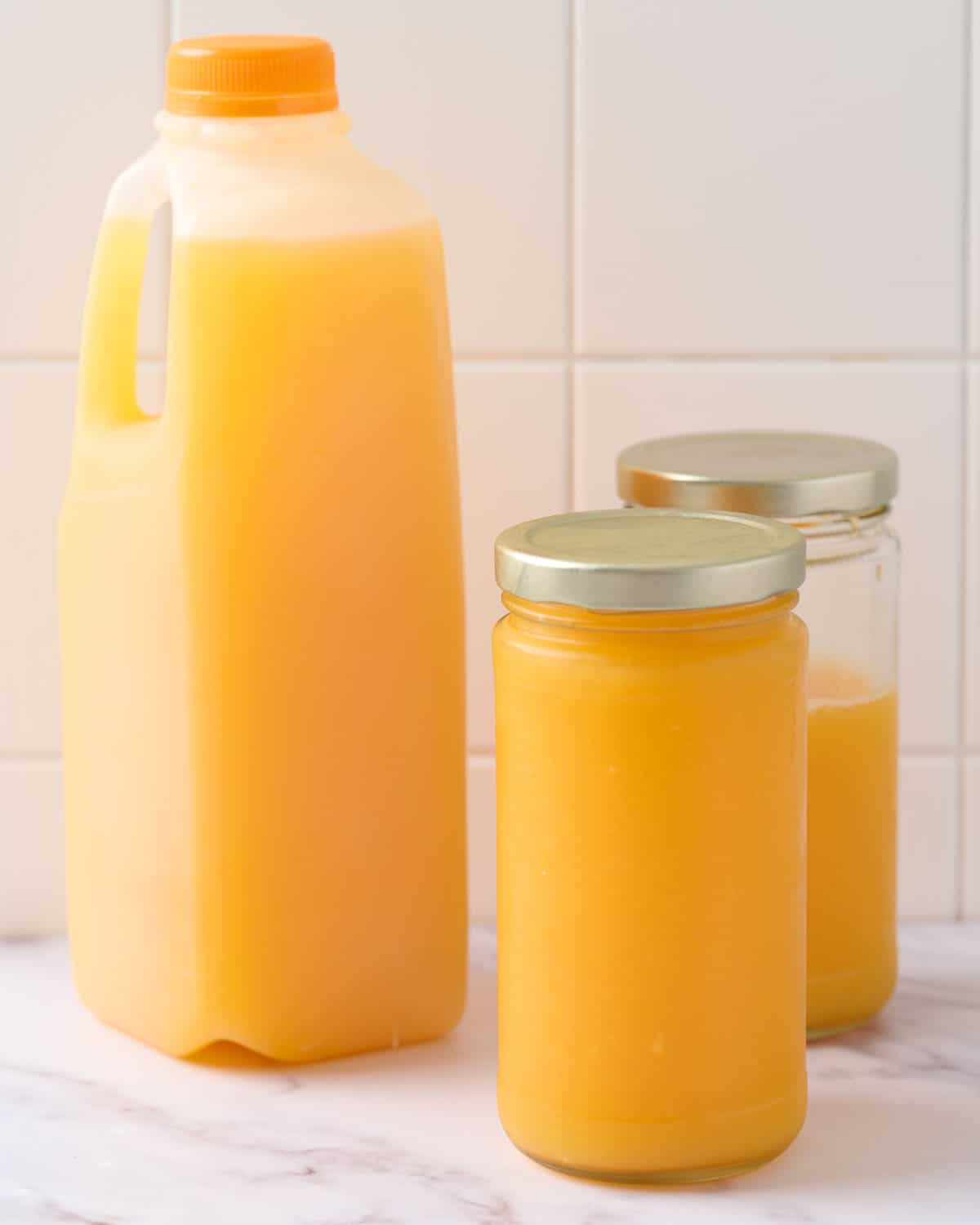
Tips for Extending Orange Juice Freshness
- Proper storage: Properly store your orange juice in a sealed, airtight container to avoid oxidation, fermentation, and rapid spoilage.
- Vacuum seal: To further prevent oxidation and bacteria growth, you can vacuum seal your juice. This storage method will allow for your juice to last upwards of a week in the refrigerator, but once the vacuum seal is broken, you have 2-3 days to consume before spoilage.
- Add citric acid: Citric acid is already found naturally in citrus fruits and helps lower the pH of your juice, meaning the acid content rises to fight off more bacteria and extend the juice’s shelf life. Generally, you will want to use ¼ teaspoons of citric acid per 32 oz (1 liter) of juice. Dissolve the citric acid in warm water by stirring them together, then add the mixture to your orange juice. Repeat this process if need be to balance the flavor, but don’t add too much or your orange juice will become overly acidic. Citric acid will extend the shelf life of the orange juice by a few days, depending on how much is added.
- Keep it clean: As with anything you make in the kitchen, be sure to regularly wash your hands and equipment, be sure to store your juice in a clean container, and be sure to wash your oranges before juicing.
FAQs
Fresh squeezed orange juice lasts 2-3 days in the refrigerator before spoiling.
Fresh squeezed orange juice lasts about two hours at room temperature before bacteria that is unsafe to consume begins to form.
Unlike grapefruit juice, you should not drink orange juice that appears cloudy. Orange juice should be a bright orange color and any cloudiness or brown color likely indicates bacteria growth and spoilage.
Due to artificial sweeteners and preservatives, store bought orange juice will last a couple weeks in the refrigerator if unopened and around one week after opening. Fresh squeezed orange juice will last 2-3 days in the fridge due to its lack of artificial preservatives.
Give your orange juice a sensory check, and if it both smells and appears okay after the expiration date, it may still be safe to consume. The acidity in orange juice also can make it a decent household cleaner to remove certain substances from countertops if not spoiled, but it will leave your counter sticky – be sure to wash your counter afterwards!
Glass containers may preserve the taste and freshness of orange juice better than plastic containers and are more resistant to odors. However, both glass and plastic containers work as long as they form a proper seal for storage.
Be sure to follow these tips to keep your fresh squeezed orange juice as fresh and delicious for as long as possible!
Recipes that Use Orange Juice
Orange juice is a great substitute for grapefruit juice and pineapple juice. Learn more about substitutes for pineapple juice and how you can use orange juice as one!
- Grapefruit Orange Juice
- Orange Agua Fresca (Agua de Naranja)
- Mandarin Juice
- Carrot Ginger Turmeric Juice
- Green Goddess Juice
- Dutch Oven Barbacoa
- Dutch Oven Carnitas (Authentic Mexican Carnitas)
- Spicy Skinny Margarita
- Kale Quinoa Salad with Orange Ginger Dressing
- Carne Asada Quesadillas
- 3 Ingredient Skinny Margarita


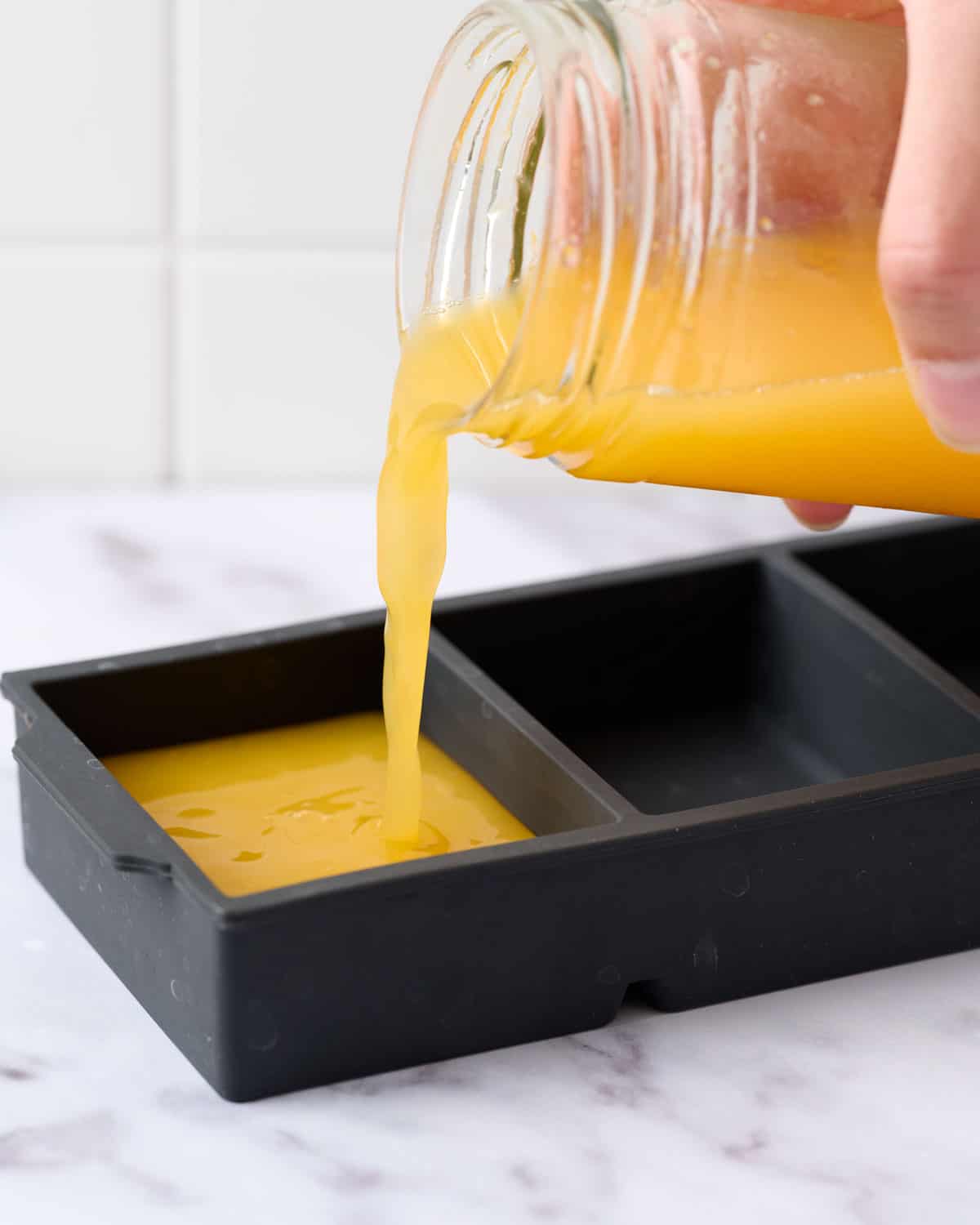
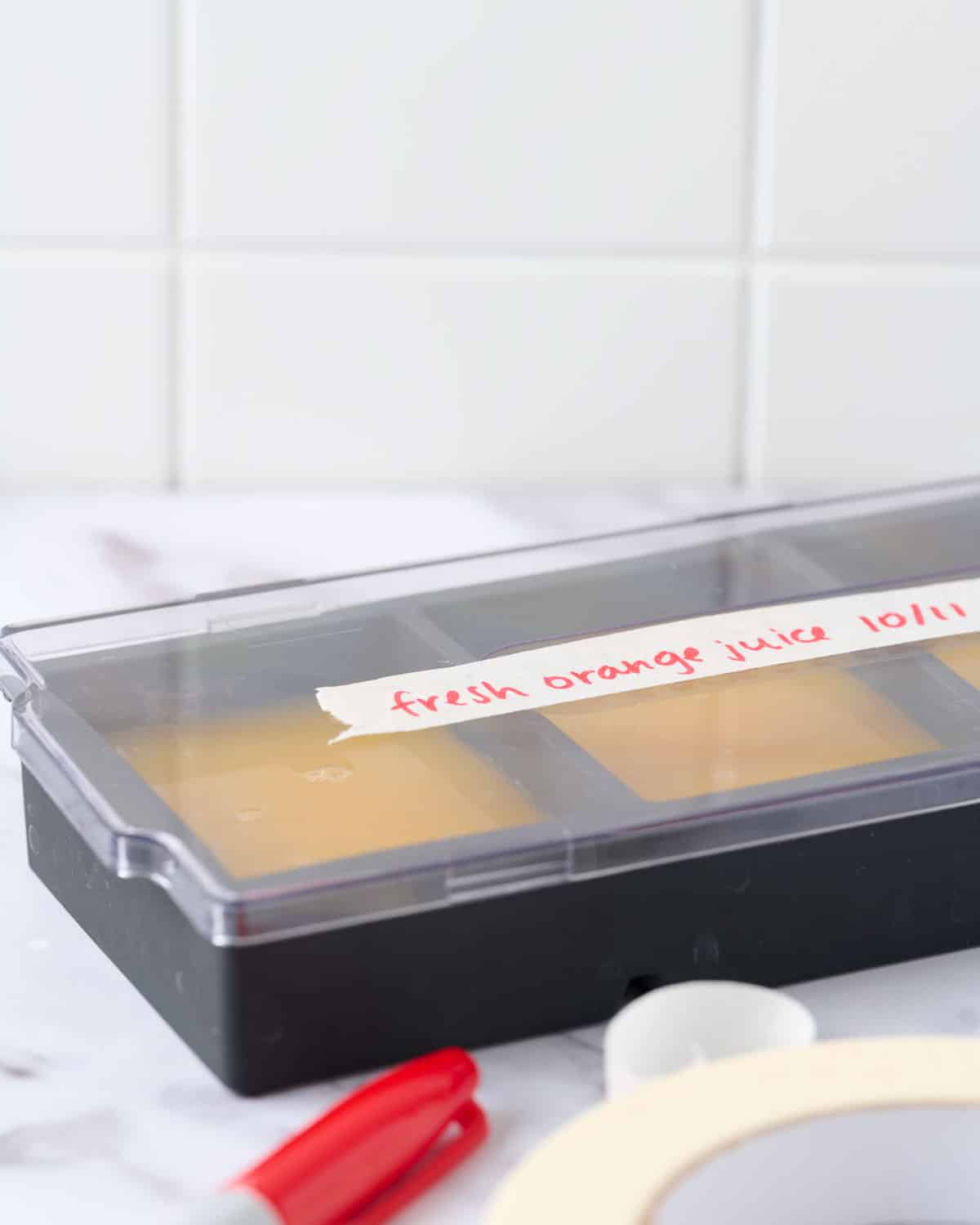



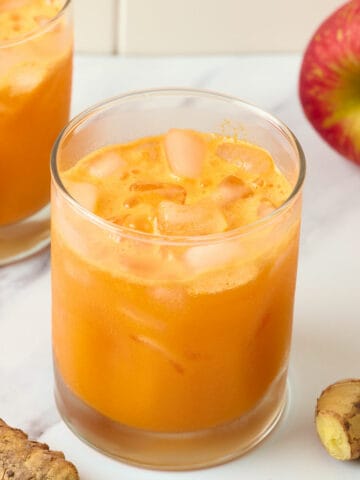
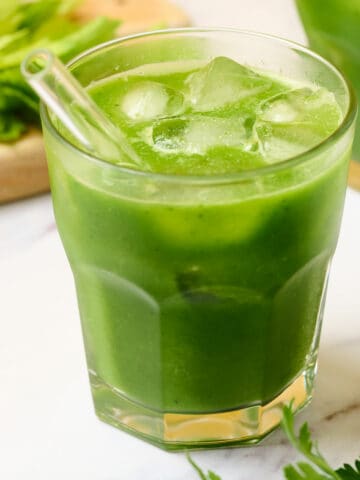
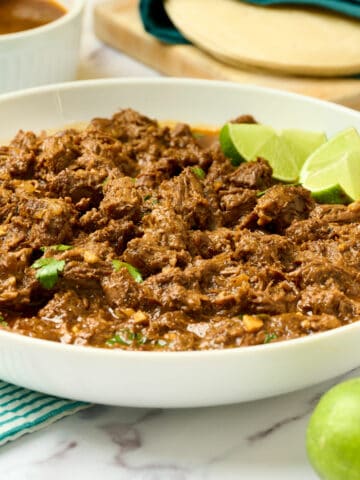


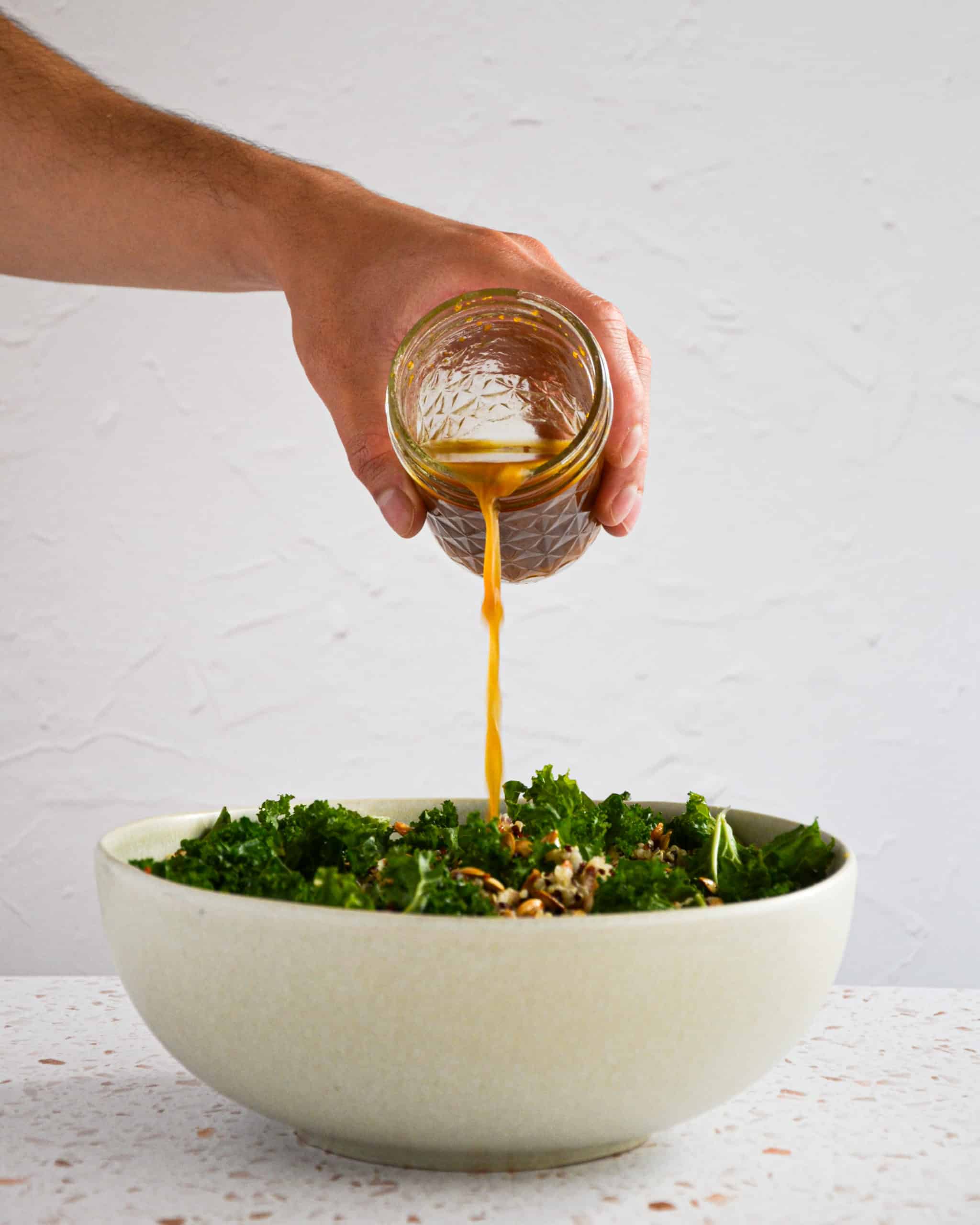



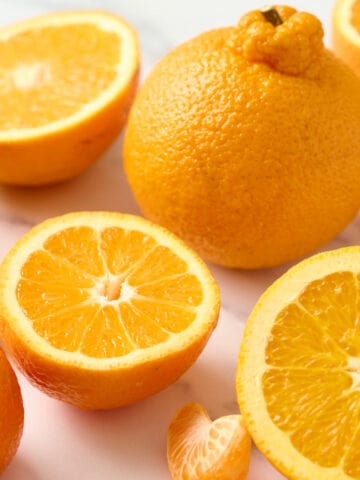
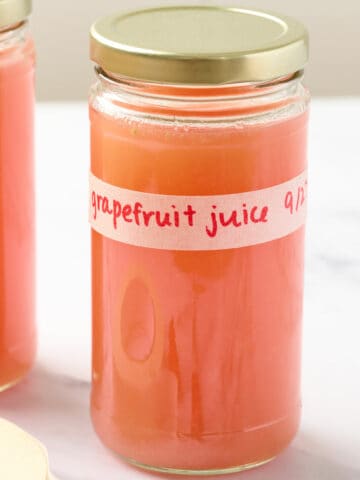

Comments
No Comments